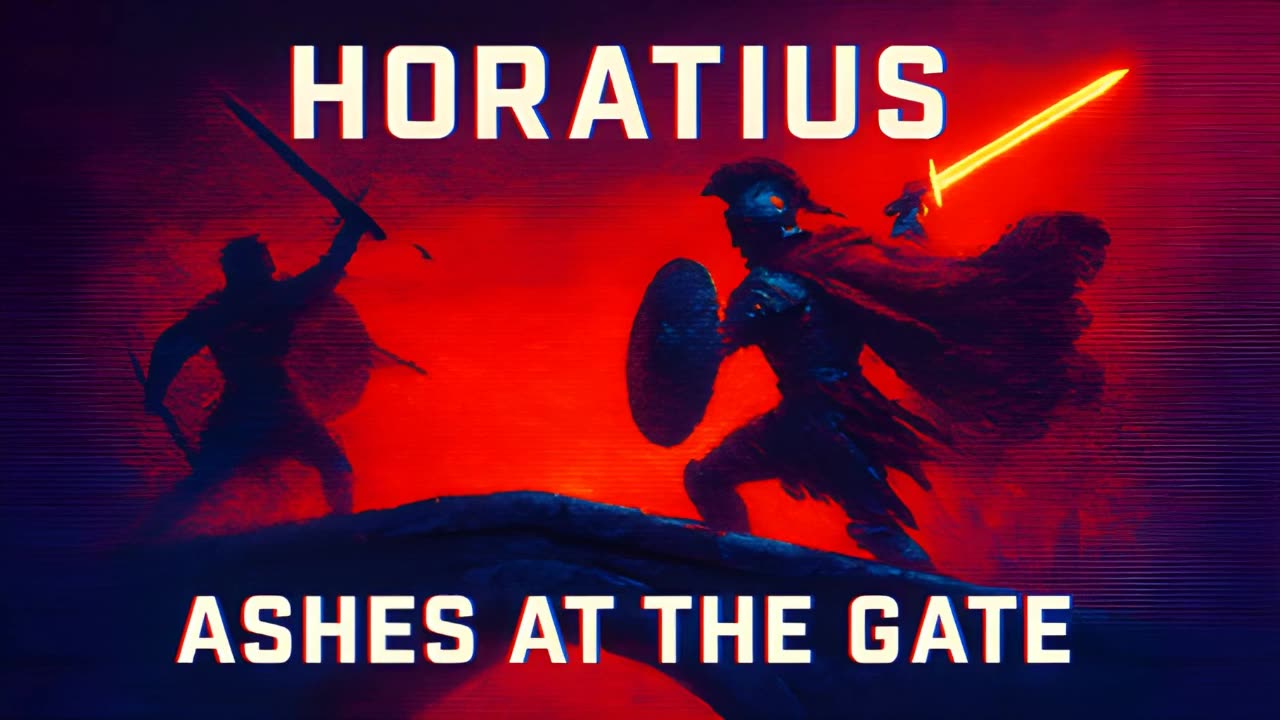Premium Only Content

Horatius // Ashes at the Gate // Occidentum Lux
OCCIDENTUM LUX – "Horatius // Ashes at the Gate" (Dark Synthwave Anthem)
Inspired by Horatius (1842) by Thomas Babington Macaulay
"The West is under siege—not by legions, but by forgetfulness."
Occidentum Lux is a musical invocation showing the light of the Western world, all of its accomplishments, sacrifice and Western civilization—fusing famous poems, myth, war, and memory into dark synthwave. This track, Ashes at the Gate, echoes across time from one of the West’s most enduring poetic legends: Horatius at the Bridge.
The Meaning Behind Occidentum Lux
Occidentum Lux ("The Light of the West") is not just a name—it is a warning.
When the memory of heroism dies, the gate is left unguarded.
The West has only ever known two types of men:
Those who stood firm and fought,
And those who failed—and perished.
This is a song for the former.
Who Was Horatius?
Horatius Cocles was a legendary Roman soldier who, during the early Republic, stood alone at the Sublician Bridge against an invading Etruscan army led by King Lars Porsena. While his comrades destroyed the bridge behind him to prevent the enemy from entering Rome, Horatius fought alone on the narrow causeway, holding back a force far greater than himself.
When the bridge collapsed, he leapt into the River Tiber fully armed, swimming back to Rome as arrows rained around him. He survived, and Rome did not fall.
About the Poem – “Horatius” (1842) by Thomas Babington Macaulay
Published in Macaulay’s Lays of Ancient Rome, “Horatius” is a Victorian reimagining of a Roman legend, written in epic ballad form. It became a pillar of classical education and was memorized by schoolboys, soldiers, and statesmen for over a century.
The most famous stanza, quoted by leaders in both world wars, reads:
“Then out spake brave Horatius, the Captain of the Gate:
To every man upon this earth death cometh soon or late,
And how can man die better than facing fearful odds,
For the ashes of his fathers, and the temples of his gods?”
Lyrical Inspirations in This Song:
Several lines in “Ashes at the Gate” are directly drawn or closely adapted from Macaulay’s original 1842 poem:
Direct from the poem:
"How can man die better…"
— Lifted word-for-word from the original.
Inspired by the legend:
“They said no man could stand here—
But my hands would never shake.”
— A modern echo of Horatius’s defiance.
Bridge quote (spoken):
“To every man upon this earth, death cometh soon or late…”
— Preserves the heart of Macaulay’s verse in its original cadence.
Final line:
“I am fire at the river, and I guard the Gate of Rome.”
— A modern tribute to Horatius’s last stand at the bridge.
This song stands as a digital monument—retrofitted in synth and steel—to the men who held the line. To Horatius. To the forgotten. To the last.
#OccidentumLux #GateOfRome #Horatius #DarkSynth #Synthwave #WesternCivilization #LaysOfAncientRome #Macaulay #RomanLegend #StandAtTheBridge #StilStandGuard
Lyrics:
They came with fire in silence,
Steel eyes beneath their hoods.
Ten thousand at the river’s edge,
And I alone still stood.
They said no man could stand here—
But my hands would never shake.
Better one soul at the gate
Than a kingdom left to break.
How can man die better,
Than before the flood and flame—
For the ashes of our fathers,
And the gods who bear our name.
Let the towers burn behind me,
Let the world forget my face.
But I will hold this narrow ground
And make the fear my place.
The bridge beneath me trembled,
Each heartbeat cracked the stone.
Their cries were louder than the drums,
But I stood like blood and bone.
No prayer upon my helmet,
No mercy in the flame.
Just a name the war would carry—
Just a death that earns a name.
How can man die better,
Than when all the lines collapse—
For the mothers in their silence,
For the knife behind our past.
They’ll write it on the river,
Where the broken swords still lie—
That I stood alone at morning,
And I did not wait to die.
"To every man upon this earth,
Death cometh soon or late...
But none shall pass this iron gate,
Till I collapse the weight."
How can man die better,
Than where gods and ghosts still burn—
For the temples lost to memory,
And the right we must return.
No anthem, no salvation—
Just the silence of the stone.
But I am fire at the river,
And I guard the Gate of Rome.
-
 2:31:14
2:31:14
Right Side Broadcasting Network
23 hours agoLIVE REPLAY: President Trump Gives a Major Address to the United Nations General Assembly in NYC - 9/23/25
84.4K75 -
 LIVE
LIVE
LFA TV
12 hours agoBREAKING NEWS ALL DAY! | TUESDAY 9/23/25
4,577 watching -
 LIVE
LIVE
The Big Mig™
2 hours agoAutism, The Deadly Truth
6,072 watching -
 LIVE
LIVE
Chad Prather
1 hour agoJimmy Kimmel UNCANCELLED After Charlie Kirk Remarks + Did Trump, RFK Jr. Get It Right W/ Tylenol?
615 watching -
![#335 Fraud, [S]elections & the Gatekeepers of the BIG Money w/ Walter Charlton & Draza Smith](https://1a-1791.com/video/fww1/6e/s8/6/o/z/D/k/ozDkz.0kob.2.jpg) LIVE
LIVE
The State of Freedom
5 hours ago#335 Fraud, [S]elections & the Gatekeepers of the BIG Money w/ Walter Charlton & Draza Smith
93 watching -
 1:44:38
1:44:38
Dear America
3 hours agoTrump Vs Big Pharma!! The Autism Epidemic Must End… + Jimmy Kimmel Is back?!
126K41 -
 LIVE
LIVE
Badlands Media
10 hours agoBadlands Daily: September 23, 2025
2,708 watching -
 LIVE
LIVE
MattMorseTV
3 hours ago $3.49 earned🔴Trump's United Nations BOMBSHELL.🔴
852 watching -
 2:09:17
2:09:17
Matt Kohrs
12 hours agoThe Powell Pump (CRWV, NVDA, ORCL, TSLA & More) || Live Trading Futures & Options
28.8K3 -
 LIVE
LIVE
Wendy Bell Radio
6 hours agoDisney's Delicious Catch 22
6,595 watching